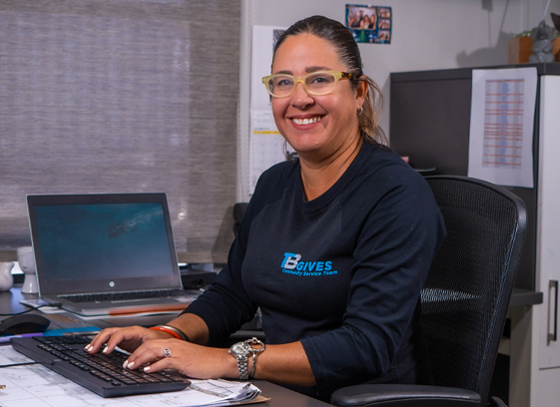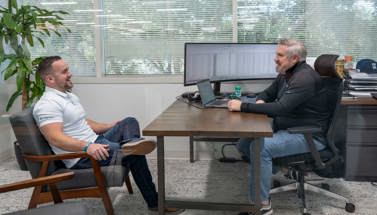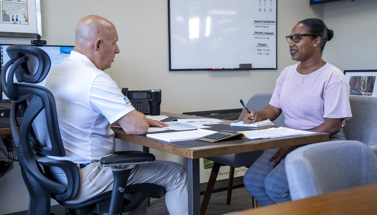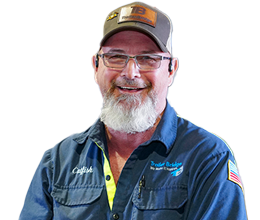
How to Land a Job in Logistics
Trailer Bridge’s Director of Talent Acquisition Amber Grant Shares Strategies for Success.
Looking to get hired in the logistics industry but aren’t sure how to get started? Trailer Bridge’s Director of Talent Acquisition, Amber Grant is here to help! Below, she shares what you need to know to get your foot in the door, based on her experience leading teams who have hired more than 500 people in the logistics industry throughout the last 7 years.
Acing the Interview
Okay, you’ve written a killer resume and been contacted for an interview. Take a minute to celebrate! You are one step closer to your goal of getting started in logistics. In this next section we look at how to shine during your interview.
What to Expect During a Phone Interview
Phone interviews are typically the first step of the interview process once a recruiter has reviewed your resume and thinks you could be a good fit. During the call, the recruiter will tell you about the position and company in more detail, ask you questions about your background, and give you the opportunity to ask them questions.
While phone interviews are less formal than an in-person interview, it is still important to be prepared. At the very least, this means being ready and available to take their call at the time you have arranged. It is also helpful to have a copy of your resume in front of you in case they have questions about the information you included.
Here are some things to keep in mind during the interview:
- Be honest: Recruiters are asking questions to see if you are a good fit for the job, AND to see if the job is a good fit for you. They want the person they hire to be happy and engaged in the position. So take a deep breath, and answer honestly!

“This is just as much about finding the right fit for the candidate as it is about find the right fit for the company,” says Amber. “Being honest about your skill set, expectations and concerns increases the chances that you land in a role well-suited for you that you can thrive in.”
- Bring the energy: On a phone interview, your voice is the only tool you have to make a first impression. So use it to advocate for you by sounding excited and interested in the conversation.
- Dont forget to smile: Believe it or not, the person on the other end can hear it in your voice when you are smiling and it naturally makes you sound more expressive.
- Come prepared with a salary range in mind: There is a good chance that the recruiter will ask you what salary you are looking to make, so don’t be surprised if this happens. This is not a trick question. It’s to make sure that the pay for the position you are applying for will align with your expectations and needs.
Tips For Deciding Your Salary Range
- Evaluate your living expenses: The best place to start is by determining your living expenses so you know the minimum salary you could comfortably live on
- Do your research: Research the job title you are interviewing for ahead of time. This will give you a benchmark of what people in similar positions are making in your area.
- Give a salary range: Always respond with a salary range instead of a single number. This helps recruiters to better gauge if you fall within the salary threshold provided by the hiring manager for the position. To determine the range, Amber suggests starting with the lowest amount you would be willing to accept and then add on $5k- $10k for the higher end.
How to Prepare for an In-Person Interview
In-person (or video) interviews are the next step and are usually done with the hiring manager for the job you applied for. The questions at this stage are much more job-specific and are meant to dig into what you know and who you are as a person. Below, Amber shares what you can do beforehand to ensure you make the best possible impression:
Research the Company
Knowing the basics of the company you are interviewing with will help you feel more comfortable and confident when answering questions. Plus, referencing company-specific details in your responses is a great way to impress the interviewer. Here are some topics to research before you go:
- Key people: Who are the decision makers? The owner/ founder, CEO, head of the department your are applying for, and your interviewer are a good place to start.
- Company values: What does the company care about? Most companies list their core values on their website. Make sure you know them and talk about the values that you have in common.
- Workplace culture: Are they laid back and casual or more traditional and serious? Be ready to share why you would make a great addition to this culture.

“Understanding what a company’s culture is matters, and in a very big way. Knowing what you want extends beyond job requirements, pay and benefits, responsibilities, and such; it’s about knowing what culture is right for you and knowing the one that you’ll be happiest at, be developed at, and thrive.“
Indie B. Bollman, Trailer Bridge Chief People Officer
- Service and/or product offerings: Does the company offer brokerage, transportation, warehousing, 3PL services, or something else? Logistics companies come in many shapes and sizes so make sure you know what market they serve.
- Recent company news: Did they recently win an award or open a new location? Make sure to mention it, especially if it is related to the job your are interviewing for.
The company website, LinkedIn and other social media platforms are good places to find this information.
Bring a Copy (or Two!) of Your Resume
As the saying goes- it’s better to be safe than sorry. Even though you will have already submitted a resume online, it is still good to have a paper copy handy during the interview. Even better, print out more than one copy in case there are multiple interviewers.
Many times, if an interview goes well, you will be moved on to the next step in the process. If that step is with a new person who may not have your resume handy, make sure you can provide them with one!
How to Demonstrate Your Skillset
If you don’t have a long job history that demonstrates your skillset in the logistics field, Amber recommends highlighting your values and work ethic instead. Examples could come from previous school projects, organizations, or volunteer experience that you were a part of.
Scan the job description and pick out the skills and values that it mentions. Then prepare 2-3 scenarios where you demonstrated each to talk about during your interview.
Questions to Ask During an Interview
Think of an interview as a two-way street. Not only is the company interviewing you, you should also take the opportunity to interview them. Asking questions makes you more marketable says Amber, because it shows you are engaged and interested in the role. Here are 3 questions she recommends asking the hiring manager during your interview:
- What would success look like for me 90 days into this role?
Why it’s a good question: Ninety days is a typical benchmark when an employee is done with training and settled into their role. Since success can mean different things to different employers, this question ensures that you are clear on the expectations for the job. - What is your leadership style?
Why it’s a good question: You spend over 40 hours a week interacting with the people (and the manager) you work with, so it’s important your working style and their management style are compatible. - What are the company’s plans over the next 5 years?
Why it’s a good question: It shows that you want to invest in the job for the long-term. It also gives you an idea of what it will be like to work at the at the company not only when you start, but a few years down the line.
Next Steps
Starting a new job (or career, for that matter!) can be hard. But with the knowledge of Trailer Bridge’s Director of Talent Acquisition behind you, you are already ahead of the game.
Here is a recap of the key things to remember:
Where to find Logistics Jobs:
- Start your search with Google then narrow it down from there.
- LinkedIn is a great asset to both search for jobs and be found by recruiters, so make sure your profile is up to date.
How to Stand Out on Your Job Application:
- Include a cover letter only if it is customized for the job and company you are interviewing with. If it’s from a template, leave it out.
- Include a list of your relevant skills at the top of your resume.
- When listing your work experience, highlight your achievements instead of summarizing the position.
How to Ace the Interview
- Be honest and enthusiastic in phone interviews.
- Research the company you are meeting with before the interview.
- Bring one (or more) printed copies of your resume.
- Come prepared with questions for the interviewer.








